“Rotterdam” Reviewed by Dan Berkowitz
“Topical” plays have a tendency to make me wince – or run in the other direction. Too often they’re didactic rather than dramatic, with the author trying to make political points at the sacrifice of story and character. Or they’re earnest – and the importance of being earnest is way overrated in my book. So when I heard about Rotterdam, which addresses the ups and downs of transgender issues, my initial instinct was to run – screaming – in the other direction.
But then I saw it was being directed by Michael A. Shepperd, one of the best directors currently working, so I thought maybe I’d give it a shot. After all, if I didn’t like it, I could just write an insipid review, saying nothing.
However, I have to say something – more than something – because Rotterdam is a beautifully written, brilliantly directed, gorgeously produced, and wonderfully acted triumph.
Okay. I guess I’ve stopped running in the opposite direction.
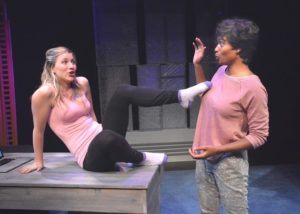
Miranda Wynne (L) and Ashley Romans. Photo: Ed Krieger
Fiona (Ashley Romans) and Alice (Miranda Wynne) are a British lesbian couple living in Rotterdam, Holland. They’ve lived there for seven years because Alice – who hasn’t come out to her family back in England – was offered a job working for a shipping company based in the Netherlands, and finds it convenient to live her life as she chooses, far away from Mum and Dad. Fiona came out to her parents some years ago, and everything was fine, but she stays in Rotterdam with Alice because she loves her.
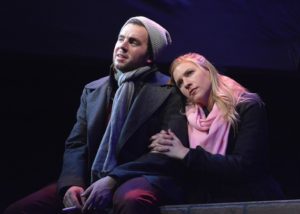
Ryan Brophy and Miranda Wynne. Photo: Ed Krieger
Of course, there are complications. Josh (Ryan Brophy) – Alice’s ex – is also Alice’s best friend. They meet, they talk, they share secrets. Which is great, despite the awkward fact that Josh is also Fiona’s brother, and, of course, his sister is the person who stole his girlfriend from him.

Audrey Cain (L) and Miranda Wynne. Photo: Ed Krieger
And then there’s Lelani (Audrey Cain), the tall, very young – very young, she’ll tell you more than once – Dutch girl who works at Alice’s office, who’s openly lesbian and very attracted to Alice, and makes all three things very clear, very often, to Alice.
All of these relationships might be fine, and simply the stuff of a sitcom, except that Fiona realizes “she” is actually “he” – a male who was born in a female body, and it’s time for her/ him to come out again.
Needless to say, this turns the situation topsy-turvy, tossing all the plot elements up in the air, and where they will land is anyone’s guess. If Fiona is a man, does that mean Alice isn’t a lesbian, but is actually straight – especially since her only previous sexual relationship was also with a man (Josh)? And if Alice is straight – or at least if her girlfriend turns out to be male – does that mean Josh has another chance with her? But what about the Dutch girl, who’s definitely trying to put the moves on Alice? And will Fiona be able successfully to transition to a new identity and persona as Adrian, the name of Fiona’s grandfather, which would have been her name if she’d been born a boy?
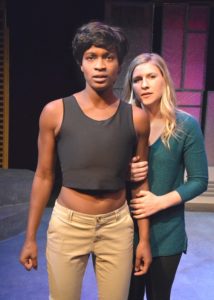
Ashley Romans (L) and Miranda Wynne. Photo: Ed Krieger
It might sound confusing, and undoubtedly it all is to the characters, but thanks to blissfully fine writing by Jon Brittain, pellucid directing by Michael Shepperd, and artfully nuanced acting by every member of the cast, it all somehow makes sense.
The play is extraordinary in that, while the story is filled with conflict, there are no heroes and no villains – not even the man who grandly says “Ladies first!” to Adrian when he’s sure he’s passed as a man, and which sends Adrian into a fury. As Alice says in the man’s defense, change takes time.
No, there are just human beings, and Mr. Brittain is smart enough to show us the uncertainty and quaking terror on both sides of the equation. Yes, Fiona/ Adrian is confused, despairing, hopeful, and irritable about this major life change. But so is Alice. Because Adrian’s new life means the destruction of Alice’s old one. As she says to Adrian at one point, I loved Fiona, and you’ve killed her.
The actors are also extraordinary, compelling and realistic, theatrical without going over the top. Ashley Romans, who made such an impression in last season’s Charm at Celebration Theatre, once again assays an androgynous role and pitches it perfectly: Fiona is a bit too butch as a woman, while Adrian is a tad too femme as a man. Ms Romans makes us see a character who’s uncomfortable in both her skin and his clothes.
As Alice, Ms Wynne matches her beat for beat: strong but vulnerable, loving and supportive, but questioning and cynical and alert for signs of betrayal and being taken for granted. Alice wants love, and needs a strong, steady presence: when Fiona evaporates before her eyes, she gloms onto Lelani like a drowning person grasps a lifesaver. But Alice is too smart – and distrustful – to let herself be sucked in to anyone else’s dream, and after a while Lelani becomes too much of a burden.
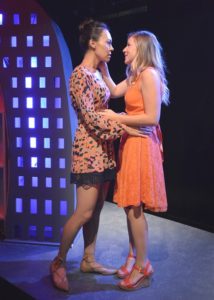
Audrey Cain (L) and Miranda Wynne. Photo: Ed Krieger
Ms Cain’s Lelani – statuesque, willowy, and with a just-this-side-of-ridiculous accent – is hilariously funny, but the actress also manages to find the human side of what could be a cartoon character. Likewise, in what could be a thankless role, Mr. Brophy mines enough facets in Josh to make him both repulsive and likable – this guy’s just trying to find his way in the world, and, alas, he has to deal with a lot of demanding people while doing it.
The technical elements are splendid: the minimalist, sleek set and vibrant lights by Jeff McLaughlin are stunning, evoking an environment at once elegant and unnerving; the appropriate and often witty costumes by Naila Aladdin Sanders; and the pulsating sound by Christopher Moscatiello, which at first could be off-putting, but as the play progresses, proves perfectly attuned to the actions and feelings of the characters.
Behind all of it, though, is the sensitive, confident, and laser-like precision direction of Michael Shepperd. The best direction rarely calls attention to itself, and his direction here is indeed subtle and self-effacing. But three moments stood out to me, as examples of how a director can make a scene greater than the sum of its parts.
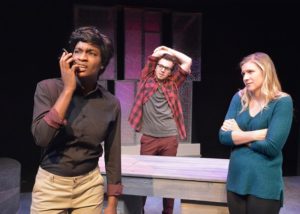
L-R: Ashley Romans, Ryan Brophy, Miranda Wynne. Photo: Ed Krieger
The first is the moment Fiona calls her parents, to “come out” as transgender. She’s been dreading the call, afraid they’ll be shocked, offended. When, apparently, they accept her without question, the sense of relief and joy on Fiona’s face is palpable. But at the same moment, just a few feet away, Alice falls apart, as she realizes she now has no allies – the momentum is on Fiona’s side, and the appalling despair on Alice’s face is devastating. The scene is beautifully staged, simple yet like a punch to the stomach.
The second is after Adrian discovers Lelani with Alice in their apartment. The scene starts out as the typical “I’ve discovered you with another woman,” but as Lelani leaves, she unthinkingly refers to Adrian as “Josh” – the male roommate she’s been told about. Once she’s gone, Alice tries to make the usual excuses, but Adrian isn’t listening: all that’s on his mind is that Lelani thought he was a man. “I passed!” is his triumphant cry: this is what Fiona/ Adrian has been seeking for months, and Ms Romans’s face at this turning point is exultant. But to Alice, crumbling, it’s the nadir of despair: Adrian may now be a man, but as Alice says, “I like girls.” Again, the staging is simple and direct, allowing the audience to see – and feel – what both characters are going through.
The third is the final scene of the play. Adrian is on a ship about to leave Rotterdam for home – England. He doesn’t know what’s ahead for him, but he knows he doesn’t have a life in Holland, and at least back home, his parents are welcoming. He’s no longer with Alice, and is desolate. But then Alice shows up, with a packed bag and a ticket: she’s decided to leave Rotterdam, leave all that she’s devised as her “safe life,” and take a chance on Adrian. The moment could have been sappy – a sort of “See? Everything will turn out all right!” But Mr. Brittain keeps it ambiguous – neither character knows what’s ahead – and Mr. Shepperd again keeps it simple and underplayed: two actors sitting side by side, talking in almost-flat tones, wondering to themselves and each other whether they’ll be able to make it. It’s plain and human and devastating and desperately moving.
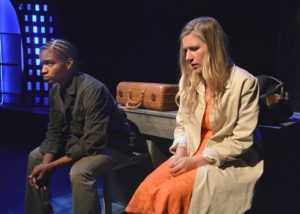
Ashley Romans (L) and Miranda Wynne. Photo: Ed Krieger
As is the production as a whole. Rotterdam is funny, it’s sad, it’s wise, it’s absurd, it’s emotional, it’s profound, and yes, it’s topical. But don’t let that scare you off.
Rotterdam
Written by Jon Brittain
Directed by Michael A. Shepperd
Through December 11
The Skylight Theatre
1816 ½ N. Vermont Ave.
Los Angeles, CA 90027
Tickets: 213-761-7061 or 866-811-4111 or SkylightTix.com

